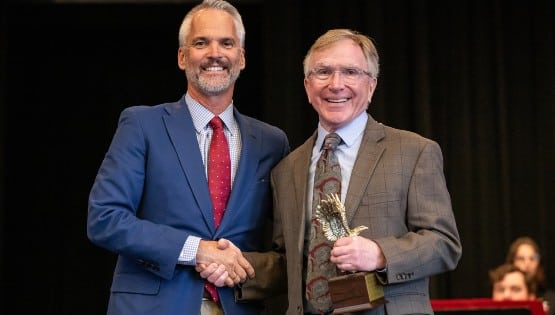
The $40,000 seed grant is through IIE’s Sustainable U.S. – Palestinian Higher Education Partnerships Program, which “aims to increase internationalization efforts between U.S. and Palestinian institutions through innovative, sustainable partnerships,” according to IIE’s website.
The joint effort will begin with the establishment of a framework for the collaboration and the development of a proof-of-concept VR platform to help students learn fundamental skills taught through nursing school labs. The framework will require communication among faculty and students from VR, computer science, nursing, health professions and medical programs at the universities, as well as the creation of a cloud-based collaboration environment, a common technology infrastructure, and curriculum development that includes virtual exchange. It will also include field visits by Shenandoah University personnel to AAUP and vice versa.
“This partnership is unique because it introduces virtual reality to global virtual learning and partners with schools in the Arab world. It further positions Shenandoah University as a leader in virtual exchange and Collaborative Online International Learning (COIL),” said Shenandoah Director of Global Virtual Learning Younus Mirza, Ph.D.
Each university brings distinctive strengths to the table. Shenandoah will contribute to the project through the capabilities and resources of the virtual reality design program and its laboratories, led by this project’s Principal Investigator Mohammad F. Obeid, Ph.D., assistant professor and director of Shenandoah’s AR/VR program, who has expertise with medically oriented simulations. Shenandoah also has highly regarded schools of nursing, health professions and pharmacy, while AAUP has strong programs in allied medical sciences, engineering, and information technology.
“An international cross-disciplinary collaboration such as this one provides the teams involved on both sides, particularly students, with the opportunity to grow professionally and personally, while contributing to an exciting and thought-provoking project,” said Dr. Obeid. “The team will leverage simulation technology such as virtual reality to augment pedagogical activities in nursing and medical education, which is sure to have impactful and tangible outcomes.”
“The project provides an exceptional capacity-building opportunity for AAUP nursing teaching faculty in using 4th-generation AR/VR technologies to improve students’ competencies in the delivery of fundamental nursing skills. Using AR/ VR technologies in nursing education would be the first of its kind in Palestine, and is expected to promote students’ engagement, creativity, and skills acquisition in a safe learning environment, and ultimately enhance patient safety in the Palestinian community,” said Dr. Mohammad Asia, professor and vice president for medical faculties’ affairs at Arab American University-Palestine.
The collaboration is expected to benefit Shenandoah’s Division of Applied Technology and strengthen AAUP’s virtual and augmented reality education programming. It is hoped this will serve as the beginning of a long-term partnership between the universities that will encompass an even wider range of disciplines in the future.










